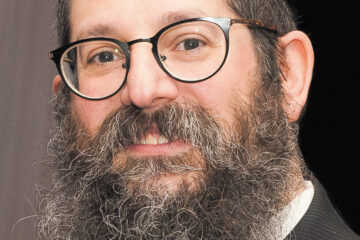Good and happy

By Rabbi Nochum Mangel
Chabad of Greater Dayton
I carry around in my pocket every day dollar bills that I received when I went to see the Lubavitcher Rebbe, may his merit shield us, on my birthday.
When I told the Rebbe that it was my birthday, he replied by wishing me a “shnas hatslacha (a year of success).” Some years, the Rebbe would add “uvracha (and of blessing).”
He did not use the more common “yom huledet sameach (happy birthday),” but deliberately chose something different. I believe he meant to convey a profound message.
There is something similar every time we mark each New Year. Jan. 1 is approaching, and, whether by email, by actual greeting cards or face to face, people regularly offer each other greetings for the New Year. The most popular of these is the simple and straightforward “Happy New Year.” We Jews as well greet each other with New Year’s wishes at the Rosh Hashanah season, but our greeting is as distinctively different from the usual, as was the Rebbe’s birthday greeting: “L’shanah tovah (May it be a good year).”
The words we use to greet each other all convey meaning: they indicate our values. Our society values happiness very highly.
The idea of the pursuit of happiness helped to express the American ideal when we declared independence, and today, the emphasis on happiness continues stronger than ever.
In August, Emily Esfahani Smith wrote in The Atlantic, “For at least the last decade, the happiness craze has been building. In the last three months alone, over 1,000 books on happiness were released on Amazon, including Happy Money, Happy-People-Pills For All, and, for those just starting out, Happiness for Beginners.”
The greetings of Happy Birthday and Happy New Year reflect our general emphasis on happiness quite well.
What distinctive values are reflected in the choice of the Rebbe to wish for a successful or blessed year, or in the widespread Jewish custom of wishing each other a good year at Rosh Hashanah? Is it because Judaism thinks happiness is unimportant or even that it is negative?
One doesn’t have to delve deeply into the Tanach (our Bible) to find that happiness is important.
“Serve God in joy,” says Psalm 100. The great Kabalist, the Ari of blessed memory, pointed out that the Torah tells us negative results come even if one does mitzvot but without joy: “Because you did not serve God with joy and a good heart (Deut. 28:47).”
The rabbis of the Talmud add to this their own emphasis: “God’s Presence only manifests itself in the midst of the joy of a mitzvah.” If happiness and joy are related to each other, then Judaism certainly teaches that happiness is important.
But looking back over these quotes from our holy teachings, it is clear that in each case, the joy was in a context.
The Torah consistently tells us that when we serve God, when we engage in a mitzvah, then we should be joyful. These positive activities should be done in a happy way.
In other words, happiness is not set as a goal in and of itself, but is urged as the mode in which we should do the essential work, doing good.
Today’s researchers spell out why there is so much sense in the Torah’s emphasis on good first, happiness afterward. Dr. Nicholas Kardaris writes in a recent issue of Psychology Today, “As anyone who ever indulges in a feel-good vice understands all too well, the euphoria of the initial feel-good experience leads to a hunger and craving for more — an addictive cycle that psychologists call ‘the hedonic treadmill.’”
In The Atlantic, Smith cites the work of scientists on the biological level. The researchers found that “people who are happy but who have little to no sense of meaning in their lives — proverbially, just here for the party — have the same gene expression pattern as people who are responding to and enduring chronic adversity.”
In other words, happiness divorced from meaning, from the work of doing good, doesn’t seem to be very good for us. If we want a happiness that is good for us, it seems we need to do good and seek the happiness of others. As Mark Twain put it: “The best way to cheer yourself is to try to cheer somebody else up.”
Do the good deed: the happiness will come. Let’s keep that message in mind as we flip the calendar once more. May this be a shanah tovah, a good year, in which we do that which is good, with joy and happiness.
To read the complete January 2014 Dayton Jewish Observer, click here.





